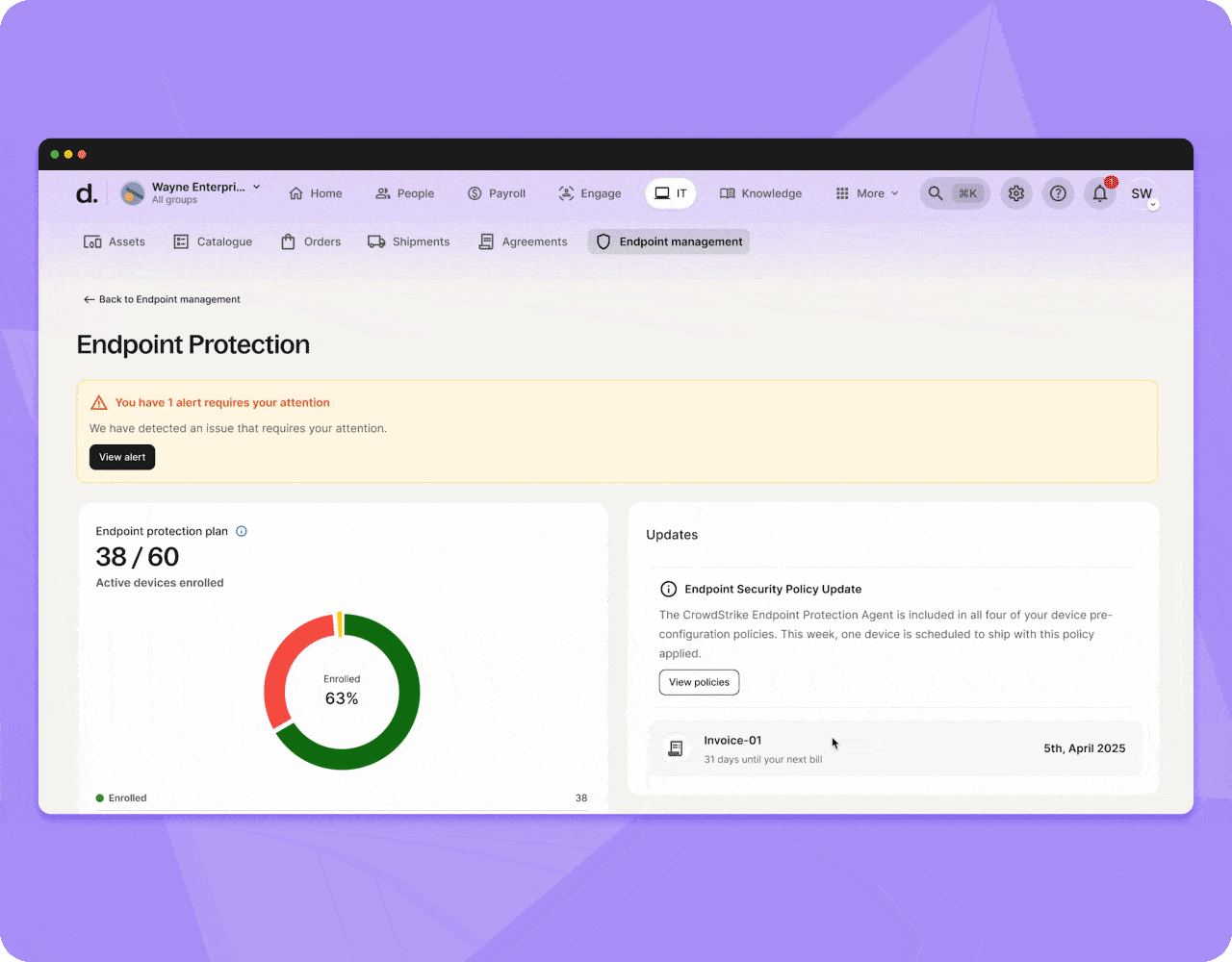Article
8 min read
Borderless IT, with Deel’s Director of Product and Principal PMM
IT & device management

Author
Ellie Merryweather
Last Update
January 30, 2026

Table of Contents
Meet the experts behind Deel IT
Global IT: Then and now
The three pillars behind a borderless IT approach
Building the blueprint for borderless IT
Key takeaways
- 75% of businesses report that their infrastructure is struggling to scale a remote distributed workforce, proving that the old ways of managing IT aren’t adapting to the modern working world.
- Remotely distributed organizations benefit from a global talent pool, but so do their competitors. To win and retain top global professionals, it all starts with IT.
- By bringing HR and IT under one roof, Deel cuts down on back-and-forth between both teams while boosting productivity and improving the employee experience for their remotely distributed workforce of 5,000+ people.
Despite the rise in remote work being old news by now, 75% of companies report that their legacy IT systems are struggling to adapt. If you’re looking to scale your business, and your IT operations along with it, it’s important to understand the new challenges your IT team faces.
Our in-house experts and Deel IT product leaders, Sam Oliver and Michael Ginzo, sat down to talk about evolutions in the IT landscape, and how IT teams can adapt to changing work patterns. You’ll also find out how we at Deel use our own solutions to support and drive productivity within a global workforce of more than 5,000 employees, with a blueprint for adopting a borderless IT mindset that works for businesses of any size.
Meet the experts behind Deel IT
Sam Oliver is the Principal Product Marketing Manager at Deel IT, and has just over a decade of experience working across various technology, cybersecurity, and biotechnology companies. Sam works very closely with the Deel product team to build solutions that streamline global employee device and application management.
Michael Ginzo is a Senior Director of Product at Deel, where he leads the development of Deel IT. In 2020, when the world shifted dramatically from IRL to WFH, he co-founded Hofy, where he spent four years as CPO. Following Deel’s acquisition of Hofy in 2024, Michael joined the team to continue building world-class IT solutions for globally distributed teams.
Global IT: Then and now
Ten years ago many, if not most, businesses operated in a centralized office-based environment. With everyone under one roof all aspects of IT were actually quite straightforward. Employees were all logging in from the same physical location, systems were built around the idea of a centralized controlled network, and getting all necessary equipment to a new hire was as simple as leaving it on their desk.
Fast forward to today, and remote/hybrid work models are becoming increasingly global. Today, you can hire the best people for any project - like an innovative developer from India, a talented project manager from Germany, or a creative marketer from Brazil - without having a local entity. But with new opportunities come new IT challenges. How to make sure that everyone is connected, protected, and supported when problems arise?
Managing global IT is far from simple. But the solution can be simplified by honing in on three core foundational principles:
- Devices: the hardware your team needs to do their jobs; laptops, tablets, monitors, etc.
- Applications: the software you use to work across borders; your HRIS, password manager, communication platforms, etc.
- Support: your organization’s ability to help employees when something goes wrong; lost passwords, locked profiles, broken keyboards, etc.
Let’s break down the new challenges faced by IT teams working to support a globally distributed team, and show you the blueprint for how Deel overcomes these challenges.
The three pillars behind a borderless IT approach
1. Devices
Devices are the foundation of an employee’s productivity, but they also pose a complex IT operations challenge as you scale a remote-first business. Where do you buy, lease, or reuse equipment, and how do you manage your vendor relationships in a scalable way? How do you manage requests for extra equipment or replacements, and how do you get your devices back from off-boarded employees in hard-to-reach places?
If you’re a remote-first company, you’re undoubtedly already grappling with these challenges. If your solution involves juggling spreadsheets, vendors, and stockpiles of secondhand equipment, you may be struggling to scale operations as your company grows.
How Deel does it
- HR and IT under one roof: When new teammates are onboarded, they’re invited to join the Deel platform before day one, where they’re able to choose their devices from the options automatically made available to them. These are then shipped to wherever they are from our hubs, even if they’re in hard-to-reach places!
- No secondhand stockpiles: With Deel IT, we supply our teams all around the world with the devices they need. This includes fresh devices for newcomers and replacing old tech for existing teammates. This works on a credit-based system, so Deel IT users don’t have to worry about recalling devices in the US and redeploying them all the way to Europe, for example. This prevents delays in getting devices to our teams and reduces waste for the organization.
- Automated and secure offboarding: The People team set an employee’s last day within Deel, triggering an automated offboarding flow. We lock and wipe devices remotely, and ensure the return of all devices to our secure warehouses for re-use.
- End-to-end equipment management: We go beyond just delivering and recalling equipment. When a teammate has an issue, we’re able to repair or replace faulty equipment in over 130+ countries.
By running HR and IT within the same platform, we’re able to automate interactions between the two and cut down on back-and-forth between these teams, while also creating a seamless experience for employees.
2. Applications
Applications are the operational backbone of remote and hybrid workforces. You have to ensure that everyone has the digital tools they need in order to do their job and collaborate across timezones and geographies. You also need to have a very clear understanding of where your data is, what type of data it is, and who has access to it. Everything has to be done with data protection and cybersecurity in mind. In short, you need complete visibility and connectivity, whilst also ensuring security.
How Deel does it
- Automated onboarding and offboarding: Thanks to HR and IT being handled within the same platform, onboarding and offboarding are easy to automate. New hires are pre-approved for the applications they’ll need access to, and access is remotely cut off on the last day for offboarding teammates.
- Remote mobile device management: We’ve partnered with JumpCloud to manage mobile devices remotely and securely, all through the Deel platform.
- Automated access controls: We’re able to eliminate orphaned accounts, excessive access rights, and security gaps by automatically adapting access as employees' status changes.
- Centralized billing management: Multi-vendor and license management are all done through the Deel platform, so IT teams spend less time manually consolidating and more time doing what matters.
By partnering with world-class tools and centralizing everything within the Deel platform, we’re able to give our IT teams maximum control and visibility and create the optimal digital environment for our workforce.
3. Support
With support, your top priority is safeguarding both team members' privacy and company assets. You also need to be able to keep productivity up by helping your employees out with smaller problems, like a broken keyboard or recovering locked accounts. And in a remote company, what happens when your lead developer can’t get online on one side of the planet because your IT team is still asleep on the other?
Providing 24/7 support for a globally distributed team with bygone solutions would add up to an inordinate amount of manual and unscale processes. But to scale a globally distributed business it is, unfortunately, necessary. Luckily, with Deel IT, we don’t have to choose between one headache or the other.
How Deel does it
- In-house team of IT experts: From Delhi to Derry, our employees have support at their fingertips - whether that means replacing hardware, troubleshooting software, or responding to security incidents.
- Built-in security: Security is always a top priority, and we’ve built market-leading IT security features. This allows us to automatically secure devices with MDM and endpoint protection and revoke application access as needed. Our commitment to safety has earned us SOC II Type 2 and ISO27001 accreditations.
- 24/7 global support: Remote device management means that even employees in the most hard-to-reach places can get the help they need.
- Loaner devices: In the case of hardware issues, we can organize SLA-backed repairs and loaners to get people reconnected as soon as possible.
With 24/7 support, we keep frustration and down-time to a minimum. This extends to all of our teammates whether they’re in the same city as the IT team or on the opposite side of the globe. This isn’t something every company can build in-house, but as your organization grows there will come a time when it makes sense to outsource this level of support.
Deel IT
Building the blueprint for borderless IT
With so many moving pieces, creating a digital workplace for a globally distributed team will never be a simple task. However, a better solution exists, and you don’t have to rely on tools that don’t cater to your organization’s needs.
Everything we do at Deel runs on Deel, which is designed to support distributed teams of any size. We’re able to recruit, equip, and support a global workforce while minimizing non-compliance risks. And with HR and IT consolidated in one platform we’re able to automate and simplify processes that ultimately make both teams more efficient.
See how Deel can help you build your new borderless IT strategy. Book your free demo today.

Deel IT: Endpoint Protection

Ellie Merryweather is a content marketing manager with a decade of experience in tech, leadership, startups, and the creative industries. A long-time remote worker, she's passionate about WFH productivity hacks and fostering company culture across globally distributed teams. She also writes and speaks on the ethical implementation of AI, advocating for transparency, fairness, and human oversight in emerging technologies to ensure innovation benefits both businesses and society.











